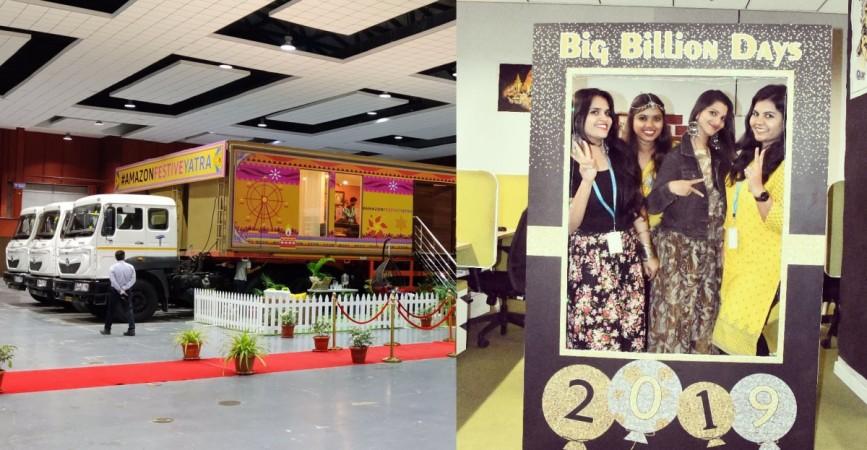
The festival season sales performance of the two e-commerce giants is giving retail traders across India a new reason to worry, apart from the slowing economy and shrinking liquidity. Flipkart and Amazon achieved combined sales of Rs 31,000 crore ($4.3 billion) during the key 15-day festival period in October, a media report says.
Although the total combined sales of the two e-commerce platforms were 14 per cent less than analyst projection of $5 billion, the impact it had on the sales of brick-and-mortar retailers has been stupendous, trade sources say. Though the economy is reportedly slowing and liquidity drying up, the alleged predatory pricing of the e-commerce giants is bringing them, new customers.
Erosion of market share
The etailers have been thrilled that they were close to the targets despite the economic slowdown. Amazon and Walmart-owned Flipkart said their Great Indian Festival sales and Flipkart's Big Billion Day sales respectively set new records during the opening week from October 31 to November 5.
We are humbled that Amazon.in is... also becoming an important driver for the new digital economy in the country."
It's notable that the nation's political leadership that hangs on to the faintest signs of apparent recovery like a movie's box-office success or crowded streets has not been enthused by the etailers performance. Market observers see that as a sign of the dampened spirits of among the brick-and-mortar retailers during this festival season. Prime Minister Narendra Modi's Bharatiya Janata Party (BJP) that heads the ruling National Democratic Alliance (NDA) draws its support mainly from the small traders. The small corner stores and grocers have seen their market share erode with the incursion of large multibrand retailers and online platforms.

The latest sales figures could also set off another round of complaints from the retail trade body Confederation of All India Traders (CAIT) which already petitioned Finance Minister Nirmala Sitharaman and Commerce Minister Piyush Goyal against the predatory pricing of the online platforms. CAIT has also appealed to Reserve Bank of India (RBI) Governor Shaktikanta Das to stop the 'unholy nexus' between e-tailers and banks. The trade body also urged Prime Minister Modi to form a group of ministers to probe the pricing policies of the e-tailers.
A report by a management consulting firm showed that the average order value for Flipkart during the season was Rs 1,976 against Amazon's Rs 1,461, indicating that customers bought higher-value items from the Walmart-owned marketplace. Citing the as-yet-unpublished report by Red-Seer Consulting, a report on the Economic Times website says Flipkart cornered 64 per cent share of the combined gross sales though Amazon continued to fare higher in net promoter score (NPS). NPS measures the loyalty of customers to a company.
Marginally ahead
Reflecting the market's liquidity squeeze, the gross sales, or gross merchandise value (GMV), missed the analyst projection by 14 per cent. Flipkart reportedly shipped 56 per cent of the units sold.
Better availability and variety of electronics and fashion items improved NPS for Amazon, while Flipkart led on the back of strong performance in smaller cities, the report said citing RedSeer's client report. Amazon had lower customer cancellations while Flipkart's reach and brand recall in smaller towns seemed better.
The competition was intense in the metros with Amazon nosing marginally ahead by one percentage point. "We are humbled that Amazon.in is... also becoming an important driver for the new digital economy in the country," the report quotes from a blog post of Amit Agarwal, country head, Amazon India.
A Flipkart spokesperson said in a statement that "this festive period we exceeded all customer metrics we measure ourselves against."














